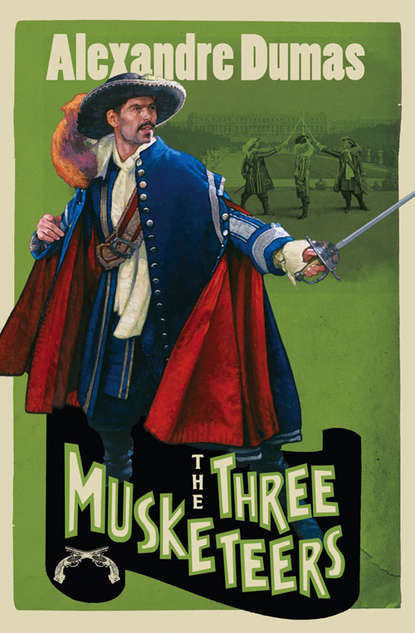По всем вопросам обращайтесь на: info@litportal.ru
(©) 2003-2024.
✖
The Three Musketeers
Автор
Год написания книги
2018
Настройки чтения
Размер шрифта
Высота строк
Поля
“By and by, by and by, when you are without your cloak.”
“At one o’clock, then, behind the Luxembourg,” shouted Porthos.
“Very well, at one o’clock,” answered d’Artagnan, as he turned into the street adjoining.
But neither in the street which he had just traversed, nor in that down which he looked, did he see any one. Slowly as the stranger had walked, he had disappeared. Perhaps he had entered some house. D’Artagnan inquired after him of every one he met; he even went down to the ferry, returned by the Rue de Seine and La Croix Rouge, but no one, actually no one, was to be seen. This pursuit, however, was so far serviceable to him, that, as the perspiration bathed his forehead, his heart grew cool, and he then began to reflect on the events which had just transpired. They were numerous and inauspicious. It was scarcely eleven o’clock, and already the morning had brought with it the loss of M. de Treville’s favour, since he must have deemed the mode in which d’Artagnan left him extremely abrupt; beside this, he had picked up good duels, with two men, each of them capable of slaying three d’Artagnans; and, lastly, these duels were with musketeers, with two of those very men whom he esteemed so highly as to rank them in his mind and heart above all the world. The Fates were against him; sure of being killed by Athos, it is clear our youth did not care much about Porthos. However, as hope is the last thing which is extinguished in man’s heart, he began to hope he might survive—it might be, to be sure, with some terrible wounds; and, under the impression that he should survive, he gave himself the following rebukes as a guard for the future:—“What a hare-brained fellow I am! What a booby! This brave and unlucky Athos was wounded on the shoulder, against which I must therefore run full butt like a ram. The only thing which surprises me is, that he did not kill me at once. He would have been justified in doing so, for the pain I caused him must have been excruciating. As for Porthos—oh! as for Porthos, upon my word, it is even more droll.” And in spite of all his efforts to restrain himself, the youth began to laugh, at the same time looking round lest this solitary merriment, which to those who might see him must appear without cause, should offend any one passing. “As to Porthos,” he continued, “it is more droll; but I am not the less a miserable giddy-pate, to throw myself thus upon people, without saying ‘take care.’ And, besides, does any one look under a person’s cloak to search for what no one supposes to be there? He would doubtless have pardoned me, had I not spoken to him of that cursed belt. It was, it is true, only by insinuation—yes, but a neat insinuation. I’faith a pretty business! Foolish Gascon that I am—a pretty kettle of fish I shall make. Come, my friend, d’Artagnan,” he continued, addressing himself with all the amenity to which he thought himself entitled; “should you escape, which is not very probable, you must practise courtesy for the future; hereafter every one must admire you, and must quote you as a model. To be obliging and polite is not to be cowardly. Observe Aramis: he is softness and grace personified. And yet did any one ever pretend to say that Aramis was a coward? No; and for the future I will in all points make him my model. Ah! singular enough, here he is.”
D’Artagnan, thus walking and soliloquising, had arrived within a few paces of the hotel d’Aiguillon, and before this hotel he perceived Aramis talking gaily with three gentlemen of the king’s guards. On the other hand, although Aramis perceived d’Artagnan, he had not forgotten that it was before this young man that M. de Treville had given way to passion, and a witness of the reproaches that the musketeers had received was by no means agreeable to him. He therefore pretended not to see him; but d’Artagnan, full of his new-formed plans of conciliation and courtesy, approached the four young men, making them a profound obeisance, accompanied by a gracious smile. Aramis bowed slightly, but did not smile. Silence fell upon the group. D’Artagnan had acuteness enough to perceive that he was an intruder; but he was not sufficiently skilled in the ways of polite society to withdraw himself dexterously from a false position, such as is generally that of a man who joins those he scarcely knows, and intrudes himself into a conversation in which he has no interest. He therefore sought within himself for some means of retreat which might be the least awkward, when he suddenly perceived that Aramis had dropped his handkerchief, and, inadvertently no doubt, had put his foot upon it. The moment appeared to be favourable for repairing his ill-timed intrusion; he therefore stooped down with the most graceful air imaginable, drew the handkerchief from under the musketeer’s foot, notwithstanding the efforts he made to retain it there, saying, as he presented it to Aramis, “I believe, sir, this is a handkerchief which you would be sorry to lose.”
The handkerchief was, in fact, richly embroidered, and had a coronet and arms in one of its corners. Aramis blushed excessively, and snatched, rather than took, the handkerchief from the hands of the Gascon.
“Ah! ah!” said one of the guards, “will you still insist, most discreet Aramis, that you are on bad terms with Madame de Bois Tracy, when that gracious lady condescends to lend you her handkerchief?”
Aramis threw such a glance at d’Artagnan, as makes a man understand that he has gained a mortal enemy. Then, resuming his soft air, “You guess wrong, comrades,” said he; “this handkerchief is not mine, and I know not why this gentleman has had the fancy to give it to me, rather than to one of you; and as a proof of what I say, here is my own in my pocket.” So saying, he drew from his pocket his own handkerchief, a very handsome one, of fine cambric, although cambric at that time was very dear; but it was without embroidery, without arms, and adorned with a simple cipher, that of its owner.
This time d’Artagnan was silent. He had discovered his mistake. But the friends of Aramis would not allow themselves to be convinced by his denial; and one of them, addressing the young musketeer with an affected air of solemnity, said—
“If the fact is as you assert, my dear Aramis, I shall be compelled to demand possession of the handkerchief, de Bois Tracy being, as you are aware, one of my most intimate friends, and I should not wish any one to display his wife’s property by way of a trophy.”
“You make this demand with a bad grace,” replied Aramis; “and on this ground alone, even were I to admit its justice fundamentally, I should still refuse compliance with your request.”
“The fact is,” modestly observed d’Artagnan, “I did not see the handkerchief fall from the pocket of M. Aramis; he had his foot upon it, however, and hence my reason for supposing that it belonged to him.”
“And you were mistaken, sir,” coldly replied Aramis, not very grateful for the apology. Then, turning to the guardsman who had avowed himself the friend of de Bois Tracy, he added, “Besides, on reflection, my worthy comrade, I am the friend of de Bois Tracy as well as yourself, and this handkerchief, strictly speaking, might have come from your pocket as well as from mine.”
“No, upon my honour,” said the musketeer.
“You swear by your honour, and I pledge my word; therefore one of us must evidently lie. But come, Monterau, let us do something better than indulge in counter assertions and denials: let each of us take half.”
“Of the handkerchief?”
“Yes.”
“Perfectly fair,” cried the other two guardsmen; “decidedly the judgment of Solomon. Aramis, you are certainly cram-ful of wisdom!” exclaimed the young men, indulging in hearty laughter; and the affair, as may be imagined, was thus deprived of further importance. Immediately afterwards the conversation ceased, and the friends separated, with a cordial shaking of hands, the three guardsmen going one way, and Aramis another.
“Now is my opportunity for making my peace with this gentleman,” mentally ejaculated d’Artagnan, who had kept somewhat aloof during the latter part of the conversation, and who now, impelled by this good feeling, approached Aramis, who was departing without taking any further notice of him.
“I hope, sir, that you will excuse me,” said he, addressing Aramis.
“Sir,” rejoined the latter, “you must permit me to remark, that you have not acted in this affair as a man of good breeding ought to have done.”
“What inference, sir, am I to draw from your remark?”
“Why, sir, I take it for granted that you are not a fool; and that, although coming from Gascony, you must be well aware that no one walks upon pocket-handkerchiefs without sufficient reason for so doing. Zounds, sir, Paris is not paved with cambric!”
“You do me injustice, sir, in thus endeavouring to mortify me,” said d’Artagnan, in whom the inherent love of quarrelling began to operate much more forcibly than his previous pacific intentions. “I am a Gascon, it is true; and, as you do not require to be informed, the Gascons are not very long-suffering; therefore, when they have once apologised, even should it be for some imprudence, they consider that they have done one half more than they ought to do.”
“What I have said to you, sir,” retorted Aramis, “is not for the purpose of seeking a quarrel with you. Thank God! I am no bully; and being a musketeer only temporarily, I never fight except when I am compelled, and then with the utmost reluctance. This, however, is a serious affair, for a lady here is compromised by you.”
“Say rather by us,” cried d’Artagnan.
“Why did you perpetrate such a stupid blunder as to give me this handkerchief?”
“Why were you so stupid as to let it fall?”
“I have declared, and I repeat, sir, that this handkerchief did not come from my pocket.”
“Well, then, you have twice lied; for I myself saw it fall from your pocket.”
“Ah, is this the tone you choose to assume, Sir Gascon? Well, I must teach you how to behave better.”
“And I will send you back to your missal, M. Abbé; so draw, if you please, this instant?”
“No, I thank you, my fine fellow; not here, at any rate. Do you not perceive that we are opposite the hotel d’Aiguillon, which is full of the cardinal’s creatures. In fact, who can say that it is not his eminence who has commissioned you to procure my head for him. Now, as it happens that I entertain what may appear to you a ridiculous affection for my head, provided it remains tolerably firm on my shoulders, I wish, before parting with it, to kill you. But keep yourself quite easy on that score; I will kill you at leisure, in a retired and secret spot, where you may not be able to boast of your death to any one.”
“I am quite agreeable,” replied d’Artagnan; “but do not be puffed up; and here, take away your handkerchief, whether it belongs to you or not; probably you may have tears to dry.”
“Spoken like a true Gascon, sir,” said Aramis.
“Yes; but that is no reason why you should delay our little affair, unless, indeed, you are influenced by more prudential motives.”
“I know well that prudence, although indispensable to churchmen, is a virtue unknown to the musketeers,” replied Aramis, “and being, as I have informed you, only a soldier temporarily, I am resolved to remain prudent. At two o’clock I shall have the honour of awaiting you at the hotel of M. de Treville, whence I will conduct you to a more convenient spot.”
The two young men then bowed to each other, and parted. Aramis proceeded towards the Luxembourg; whilst d’Artagnan, finding that the time approached, took the road to the Carmes Deschaux, all the while inwardly ejaculating—“Positively, I cannot escape! but at all events, if I am killed, it will be by a musketeer.”
5 The King’s Musketeers and the Cardinal’s Guards (#ulink_e22bf3a2-b8e6-5312-a6f3-c545c82872dd)
D’ARTAGNAN WAS FRIEND LESS in Paris. He therefore went to meet Athos without being provided with a second, having made up his mind to be satisfied with those which accompanied his adversary. Besides, he fully intended to offer the brave musketeer all suitable apologies, but, at the same time, to betray nothing having the slightest appearance of timidity or weakness. He also feared such a result from this duel as may be naturally anticipated in an affair of the kind, where a young and vigorous man fights with an opponent who is wounded and enfeebled; and in which, should the former be vanquished, the triumph of his opponent is doubled; whilst, should the former prove the conqueror, he is not only accused of being brave at small risk, but even his courage is regarded as extremely doubtful. Moreover, unless we have been unsuccessful in our attempt to portray the true character of our adventurer, the reader must have already remarked, that d’Artagnan was no common type. Therefore, although he could not divest himself of the idea that his death was inevitable, he had by no means resolved quietly to resign himself to his fate with that patience which another less courageous than himself might perhaps have displayed in such a case. He pondered upon the different characters of those with whom he was about to engage, and at length began to obtain a clearer view of his situation. By means of the sincere apology which he contemplated, he hoped to conciliate Athos, whose aristocratic air and austere manner quite delighted him. Then he flattered himself that he might intimidate Porthos by the adventure of the belt, whose story, if he were not instantaneously killed, he might relate to every one, so as to overwhelm him with ridicule. Lastly, as regarded the quiet Aramis, he entertained very slight apprehensions; for, supposing that he should survive to fight him, he entertained no doubt of his ability to make short work of him, or, at all events, by wounding him in the face (as Cæsar recommended his men to do with Pompey’s soldiers), to spoil for ever that beauty of which he was so vain. In fine, d’Artagnan now brought into action those principles of unconquerable and steady resolve which the counsels of his father had implanted in his heart—counsels which, as we know, had instructed him to submit to nothing like indignity unless it proceeded from the king, the cardinal, or M. de Treville.
Full of these ideas, he sped as if on wings towards the convent des Carmes Deschaux—a building without windows, adjoining a chapel of ease of the Pré-aux-Clercs, and surrounded by dry meadows, which generally served as a rendezvous for those combatants who had no time to lose. As d’Artagnan came in sight of the small open space in front of the convent, it struck the hour of noon, and Athos had already been about five minutes on the ground. He was therefore as punctual as the Samaritan woman, and the most rigorous casuist in the laws of duelling could have found nothing to censure.
Athos, who continued to suffer severely from his wound, although it had again been dressed by M. de Treville’s surgeon, had seated himself on a large stone, where he awaited his adversary with that air of calmness and dignity which never forsook him. As d’Artagnan approached, he arose, and politely advanced some steps to meet him; whilst d’Artagnan, on his part, went towards his antagonist bowing until his plume touched the ground.
“Sir,” said Athos, “I expected two of my friends who are to act as my seconds, but they are not yet arrived. I am surprised that they should be so late, as they are generally punctual!”
“I have no second, sir,” said d’Artagnan; “I only arrived in Paris yesterday; consequently I am unknown to any one here except M. de Treville, to whom I was introduced by my father, who has the honour to claim his friendship.”
Athos mused for an instant, and then said: “So M. de Treville is your only acquaintance?”
“Yes, sir, I know no one but him.”
“Oh, then,” continued Athos sotto voce, “if I should kill you, I shall acquire the reputation of a child-eater.”
“Not entirely so, sir,” answered d’Artagnan, with a bow which was not devoid of dignity, “not quite so; since you do me the honour to draw your sword against me whilst suffering from a wound which must occasion you great inconvenience.”
“Inconvenience! Upon my honour I assure you that you hurt me confoundedly. But I will use my left hand, as I usually do under such circumstances. Yet do not imagine that by this means I do you a favour, as I fight equally well with either hand. Indeed, it will rather be a disadvantage to you, a left-handed man being a very trying opponent to one who is not used to it. I regret, therefore, that I did not apprise you sooner of this circumstance.”
“Really, sir,” said d’Artagnan, again bowing, “you are so very courteous that I cannot be sufficiently grateful.”

















